As soon as the National League for Democracy (NLD) landslide victory became known, on November 11, its Vice-Chairman Zaw Myint Maung issued an open letter, or rather an overture, addressing the 48 ethnic political parties (EPPs) to cooperate in the party’s quest for the realization of democratic federal system of governance.

This is being followed by a ten-point statement of November 18 outlining the party’s duty towards the people, which they have entrusted the party to serve.
The statement confirms the NLD landslide election victory and reiterates the party’s struggle of 32 years; thanks the people for active participation in the general elections; thanks the Union Election Commission (UEC) and party members; vows to realize the aspirations of the people which are peace, development and establishment of democratic federalism; acknowledges and thanks the elected MPs for their deliberations; demands the release of the three NLD candidates held by the Arakan Army; congratulates the elected MPs from the EPPs and calls for cooperation to realize democratic federalism; and thanks all well-wishers domestic and international for their congratulatory notes on the NLD victory.
EPPs welcome NLD overtures
In principle, the EPPs welcome the NLD overtures but most are cautiously optimistic. For example, the Kachin State People’s Party (KSPP) mentioned in its reply to the NLD that it is ready to cooperate in the national unity deliberations under the acceptance of 1947 Panglong Agreement.
U Kwan Gaung Aung Kham, Vice-Chair-2 of the KSPP said: “The NLD mainly needs to implement the 1947 Panglong Agreement. The KSPP will make discussions with other parties in ethnic regions on whether we will join hands with the NLD or not,” according to Burma News International recent report.
Likewise, the spokesman for Shan Nationalities for Democracy (SNLD), Sai Leik although he welcomes the NLD overtures told The Irrawaddy in an interview: “The NLD might have goodwill towards ethnic people but it did not have predetermined plans [for a coalition government]. It was just a response to the military’s statement (that the government has to take responsibility for the election irregularities).”
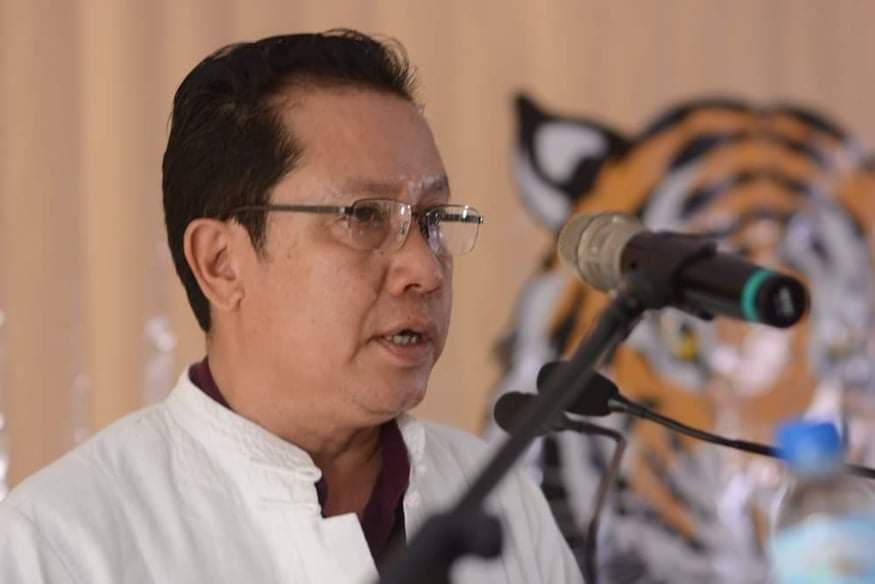
“If there is decentralization and regional and state ministers are given greater powers — at present they don’t even have proper offices — and if the NLD appoints members of ethnic parties as chief ministers and devolves greater powers to ministries, it will increase trust.”
“By doing those things, the NLD will boost national reconciliation and contribute to the stability and peace of our union,” according to The Irrawaddy recent report.
Recently, a video podcast posted by Kachin News Group showed Duwa Mahkaw Hkun Sa, a Kachin lawyer living in the UK, saying that the NLD overtures is a Bamar supremacy scheme and not offering the EPPs to participate in a national unity government. In other words, the EPPs may follow the NLD’s prescription on how to go about, but not as a coalition, equal partner.

Lopsided playing field
According to the military-drafted 2008 constitution the EPPs are handicapped from the outset.
Structurally the 7 ethnic states are balanced against 7 regions, mostly dominated by the Bamar ethnic people and they are also numerically the majority, which is said to be about 68% of the whole country, although the figure is disputed by many non-Bamar ethnic observers.
Again the electoral system is first pass the post (FPTP), which is the zero-sum game or winner take it all. And with the numerical majority constituencies with majority population, the competing Bamar-dominated political parties, such as the NLD and military-backed Union Solidarity and Development Party (USDP) are bound to collect the most seats. On top of that as these two major parties, the former a financially well-heeled with the Bamar majority voters’ backing and the latter, the powerful military-backed party could field their election candidates all over the country. But the EPPs usually contest only within their respective own states, with some exception expanding into other ethnic states or regions where their ethnic kin reside, such as the SNLD running in Kayah and Kachin states where Shan have sizable population.
As such, so long as the FPTP system is in place, the EPPs will always be underlings within the parliamentary system.
The sum up statistic below shows how the EPPs will be handicapped unless the electoral system is altered, which means the military-drafted constitution will also have to be drastically amended or rewrite anew, so that a level playing field can be realized.
According to SNLD Joint-Secretary Sai Kyaw Nyunt’s compilation, the outcome of the 2020 general elections were: the appointed military got 168 seats or 25%; NLD got 396 or 59.7%; USDP won 33 seats or 5%; the EPPs combined got 46 seats or 7%; and 22 seats or 3.3% vacancy which were not elected, due to the UEC ruling to be excluded.
Likewise, the last legislature period, starting 2016 which is about to end in 2021 February, the breakdown were: the appointed military got 166 seats or 25%; NLD got 386 or 58.1%; USDP won 42 seats or 6.3%; the EPPs combined got 61 seats or 9.2%; and 9 seats or 1.4% vacancy which were not elected, due to the UEC ruling to be excluded.
As a result, the EPPs vote intake for 2020 elections were 2.2% less than in 2015, due to 9 excluded townships in Arakan State and one in Shan State, where the Arakan National Party (ANP) and SNLD would definitely win in their respective states. In all, the situation in ethnic states could be said to be the same, with even some increase win for the EPPs in Kayah and Mon states, where normally the NLD wholly win.
In short, in the Upper House and Lower House, known as Amyotha Hluttaw and Pyithu Hluttaw, the EPPs have no chance to become a formidable party bloc that can build national union government. In addition, even if the individual EPP could win in its respective state, it won’t be able to form government and install chief minister, as the Union president will be the one to decide, according to the constitution.
What kind of national unity government?
If in case, the NLD is really earnest to achieve peace and ready to pave the way for an acceptable federal union aspired by the EPPs and the ethnic nationalities as a whole, a few things have to be in order or adjusted.
Bridging conceptual differences
First of all, it is most important to bridge the differing concept of how the country called “Burma” came into existence.
The successive Bamar-dominated regimes are convinced that the present day country stems from the immemorial Burmese empire handed down to them by the Burmese kings of the past and that the non-Bamar ethnic nationalities are part and parcel of that empire. In other words, the ethnic territories and the inhabitants belong to them, “colonial subjects” of the Bamar center if one wants to use the more politically appropriate term.
But in contrast, the EPPs and also the ethnic armed organizations (EAOs), including all the ethnic nationalities, see that Burma is a new political entity created by the virtue of Panglong Agreement in 1947, prior to the independence from the British in 1948. And the Panglong Agreement is the sole, legal bond between the Bamar State, then known as Burma Proper or Ministerial Burma, and the ethnic states.
Only after this hurdle is cleared can we start to ponder on the constitution-making which has been in crisis since the inception of the country in 1948.
Constitutional amendment
Basically, the EPPs, EAOs and all ethnic nationalities want to establish an equitable ethnic-based federal union, while the Bamar-dominated political parties and the military prefer a unitary system, with some federal trappings and power devolution to a certain extent. In other words, the Bamar supremacy stance would have to be maintained and in place, as has always been the case. Some decentralization may be allowed but the central control will be in tact, which will be in the hand of the Bamar-dominated government. And the emphasizes will be 14 unit-based, to counter the 8-state based, where ethnic nationalities’ ethno-nationalism aspirations are predominant.
In short, the name of the game will be ethnic federal rights with veto rights to protect weaker states versus unit-based, with limited decentralization according to the prescription of Bamar-dominated powers that be in Naypyitaw, so to speak.
Federal democracy or democratic federalism
Another sticking point is the argument of federal democracy and democratic federalism. The EPPs want to use federal democracy, while the NLD prefers democratic federalism. The EPPs argued that using federal in front is to emphasize ethnic identity rights and should be a built-in group protection against tyranny of the majority. The NLD wanting to have democracy in front of the federal is to insert its domination in national politics, as it might see, rightly or wrongly, as a majority voice holder, it is entitled to call the shots in national politics.
Thus, this seemly unimportant choice of words needs to be tackled, clarified and agreed upon in the course of time, as it is crucial in the underpinnings of the constitution for the ethnic nationalities.
And finally, the NLD needs to consider if it just want to hand out some portfolios to some ethnic leaders, without consulting their respective parties, or would like to work in the form of coalition partner with coalition agreement officially signed, like in all Western democratic countries.
Practical undertaking for national unity government
Nuts and bolts needed to usher in a workable national unity government can be numerous. But let us concentrate only on some of them.
First, the attitude of the NLD to act as a coalition partner is the most important factor. It won’t do if it consider itself as an employer to the EPPs and just appointed some ethnic individuals in some important portfolios, without bothering to talk or agree with the concerned EPP as a coalition partner, like during the last legislature period, which is about to end soon. Many EPPs have pointed out that this kind of undertaking foster more division among themselves and also with the NLD, rather than empowering reconciliation.
Second, NLD needs to empower the EPPs, especially in the governing of the ethnic states, giving them incentive to run their own state affairs, either in coalition with NLD or empowering the local parties that have won the most seat, for example like the ANP in Arakan State, with the least central intrusion in the ethnic states’ decision-making process.
Third, in union or national level, EPPs’ leaders should also occupy some key ministries as their parties’ representatives, to portray the national unity government means business.
Beyond unity government
During the national unity government period, provided that the NLD really is earnest to form one, the issues of achieving peace or at least a durable truce with the EAOs countrywide; constitutional amendment; and socioeconomic development should be discussed and implemented, in a united front manner, for the sake of the country.
And beyond the unity government considerations for the future political system be brainstormed and agreed upon. For example, to foster the two party system of US and UK; two and a half political system of Germany; or one party system of Singapore and so on.
While the two party system of the US and UK are well known as a competition between the conservative and democrat parties, the two and a half party system of Germany is not quite well known in Burma.
In Germany, two people’s party the Christian Democratic Union (CDU) and Socialist Party of Germany (SPD) have been contesting the elections since the end of Second World War. But both parties have to rely on a medium third party such as Free Democratic Party (FDP) or Green Party to form government, as both parties most of the time don’t achieve absolute majority and thus have to form a coalition pact with the third medium party.
During the last decades the people’s parties have dwindled to an extent that they barely receive 30 to 40 percent of the votes and thus have resorted to a grand coalition between themselves (CDU & SPD), to be able to govern.
And then, we have Singapore one party system where the People’s Action Party (PAP) always won the super-majority since 1959 until today. The opposition parties have no influence or meaning in electoral landscape of Singapore.
As all can see NLD might be tempted to become like the PAP of Singapore. But the situation is different as there is the Tatmadaw or military and also the ethnic states, which are more inclined to uphold their ethnic identities and power-sharing along ethnic lines, which are deeply rooted.
But first and foremost, the NLD task now is to end the ethnic conflict war and amend the constitution. And to be able to do this it will have to build a national unity government, or better a national reconciliation government, between the ethnic nationalities, Tatmadaw and itself.






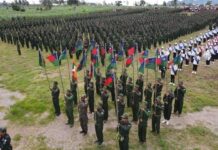
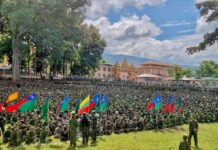
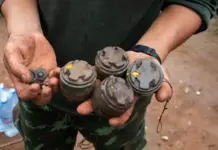
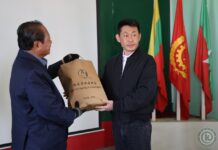

Leave a Comments